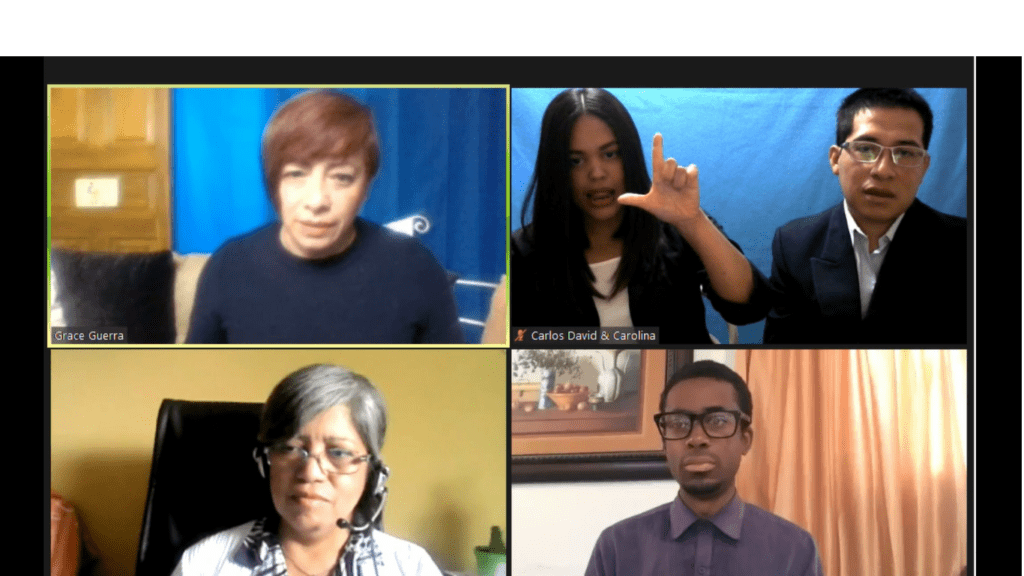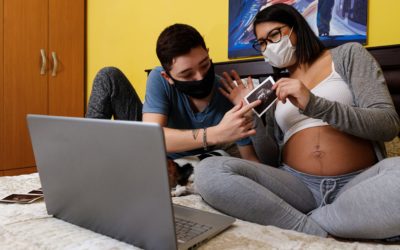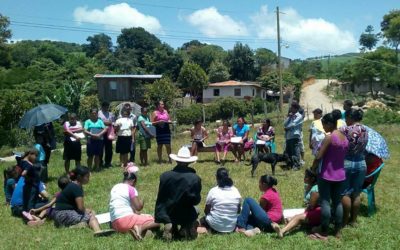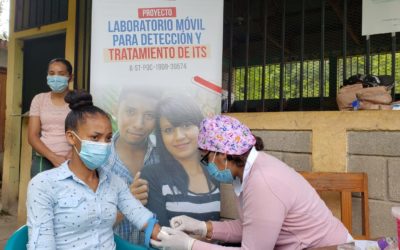🇪🇨 The Waal Foundation (FdW) directed and adapted its Basic Course for promoters with hearing disabilities. This effort carried out in conjunction with the Labor Integration Service (SIL) of Quito, allows us to arrive with the prevention message with an inclusive approach.
This training process was developed by the mediator Luz Mejía, who is also a SIL official and has been part of the Advanced Course for Mediators in the Prevention of Diseases and Deficiencies in the prenatal and postnatal stages.
In the first stage, which was completed between July and August 2020, 19 SIL beneficiaries were trained in understanding and transmitting messages to prevent deficiencies and disabilities in the community with an inclusive approach. The participants who were trained are able to recognize risk factors in couples and the environment and develop specific prevention actions in a personal, family and community way.
During the implementation of the Basic Course, the promoters made home visits, held health fairs, and implemented social marketing campaigns. In addition, they organized and delivered the ABCD and 3 + 9 = Healthy Baby workshops. To carry out this course, the sessions were carried out through videoconferences, with additional materials, mainly of a visual nature, and with interpretation through sign language.
Luz Mejía explains that having been trained as a mediator in the PreNatal Program, her objective was to learn the methodological tools and knowledge that are taught in the courses, to replicate them in specific communities, such as people with hearing disabilities.
“It has been a very satisfying challenge to have been part of the design of this Basic Course. From the call to the participants, to the preparation of each workshop, there were long hours of work to achieve the adaptation of the material, the staff of the Foundation was totally involved in the development of this course. The audiovisual content was interpreted in sign language by Ricardo Moya, an interpreter who supported us in this regard and I did the voiceover of the videos that were taught. ”, He comments.
Interpretation in sign language was also maintained, while the sessions were carried out live, through videoconferences. Luz indicates that the most interactive and suitable materials were chosen, according to the special capacities of the participants, therefore the planning of each training was carried out in a very rigorous way, “to be sure that the knowledge and methodologies that are they were going to teach and would be understood by the members of the community ”.
Ingresa aquí: https://www.youtube.com/watch?v=cpuVVjpJYrA y conoce parte del trabajo de adaptación realizado por el equipo de la FdW para el desarrollo de este Curso Básico.
SIL is a specialized program in the normalized labor integration of people with disabilities, through guidance, job promotion, information on the job market, training, job placement, advice and support in the labor integration process. The SIL itself was in charge of selecting the participants, who received the training for free with a 100% subsidy from the FdW which included materials, facilitation, monitoring, the delivery of a certificate and access to the virtual platform.
The training and awareness-raising process involved 20 home visits carried out among people with hearing disabilities, with a direct outreach to 88 members of the community, among adolescents and adults of reproductive age. The realization of a digital health fair, which reached 50 people, mostly members of the SIL, with some type of disability.
One of the tools that the FdW had been using previously: education through digital platforms, continues to show that technology, the internet and virtual environments are the new door for training and promoting health education. This course specifically includes participants with special abilities and who have managed to be part of the Foundation’s training offer.
Carolina, 29, and Carlos David, 31, are a married couple who were part of the Basic Course. The two were satisfied with the content received and see it as an opportunity for personal and couple training, which can be shared with more people with hearing disabilities.
Carlos David points out that issues related to health and prevention “were dealt with openly and that is very important, because deaf people have not had the opportunity to learn about such fundamental issues as sex education”
Carolina agrees with this assessment and believes that the Basic Course has facilitated “that the rights and strengths that we have within our community are fulfilled, because they have brought us closer to information that is very necessary.” She considers that knowledge related to pregnancy planning and care during pregnancy are the aspects that stand out the most in training and she hopes to be able to share what she has learned with more people who have the same disability.

Carlos Arce was also in charge of interpreting some of the course content in sign language and from his work at SIL he supported the formation of the group that participated in the Basic Course. He indicates that he is motivated by the results obtained, especially from the field of inclusion. “Many people, due to their disabilities, do not have access to this type of knowledge, that is why this training is very important, as it allows us to learn clearly, professionally and with quality issues such as the protection of our health and that of our families. , the importance of maintaining good communication, avoiding violent environments, taking care of our children ”, he says.
The three participants believe that this experience should be replicated to more people with disabilities in the country, while they hope to continue with the rest of the training offered by the PreNatal Program, in order to, in turn, support their peers or others in training. collectives and communities that require it.
El material adaptado especialmente para este Curso Básico evidencia el compromiso de Fundación de Waal con su misión de contribuir a la construcción de una cultura de prevención con participantes con discapacidad auditiva.
In this way, it is expected to motivate the participants to continue their training with the Medium and Advanced courses and to continue linked with the FdW and its Network of Mediators, through the various training processes and in the development of service actions with their communities.
Meet our next trainings HERE



